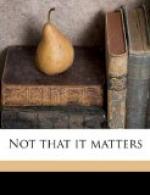Chess has this in common with making poetry, that the desire for it comes upon the amateur in gusts. It is very easy for him not to make poetry; sometimes he may go for months without writing a line of it. But when once he is delivered of an ode, then the desire to write another ode is strong upon him. A sudden passion for rhyme masters him, and must work itself out. It will be all right in a few weeks; he will go back to prose or bills-of-parcels or whatever is his natural method of expressing himself, none the worse for his adventure. But he will have gained this knowledge for his future guidance—that poems never come singly.
Every two or three years I discover the game of chess. In normal times when a man says to me, “Do you play chess?” I answer coldly, “Well, I know the moves.” “Would you like a game?” he asks, and I say, “I don’t think I will, thanks very much. I hardly ever play.” And there the business ends. But once in two years, or it may be three, circumstances are too strong for me. I meet a man so keen or a situation so dull that politeness or boredom leads me to accept. The board is produced, I remind myself that the queen stands on a square of her own colour, and that the knight goes next to the castle; I push forward the king’s pawn two squares, and we are off. Yes, we are off; but not for one game only. For a month at least I shall dream of chess at night and make excuses to play it in the day. For a month chess will be even more to me than golf or billiards—games which I adore because I am so bad at them. For a month, starting from yesterday when I was inveigled into a game, you must regard me, please, as a chess maniac.
Among small boys with no head for the game I should probably be described as a clever player. If my opponent only learnt yesterday, and is still a little doubtful as to what a knight can do, I know one or two rather good tricks for removing his queen. My subtlest stroke is to wait until Her Majesty is in front of the king, and then to place my castle in front of her, with a pawn in support. Sometimes I forget the pawn and he takes my castle, in which case I try to look as if the loss of my castle was the one necessary preliminary to my plan of campaign, and that now we were off. When he is busy on one side of the board, I work a knight up on the other, and threaten two of his pieces simultaneously. To the extreme novice I must seem rather resourceful.
But then I am an old hand at the game. My career dates from— well, years ago when I won my house championship at school. This championship may have carried a belt with it; I have forgotten. But there was certainly a prize—a prize of five solid shillings, supposing the treasurer had managed to collect the subscriptions. In the year when I won it I was also treasurer. I assure you that the quickness and skill necessary for winning the competition were as nothing to that necessary for collecting the money. If any pride remains to me over that affair, if my name is written in letters of fire in the annals of our house chess club, it is because I actually obtained the five shillings.




